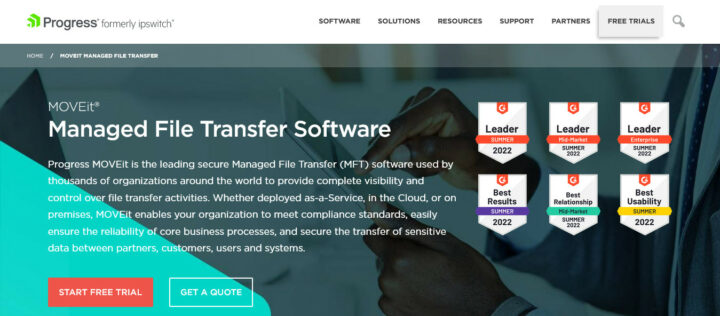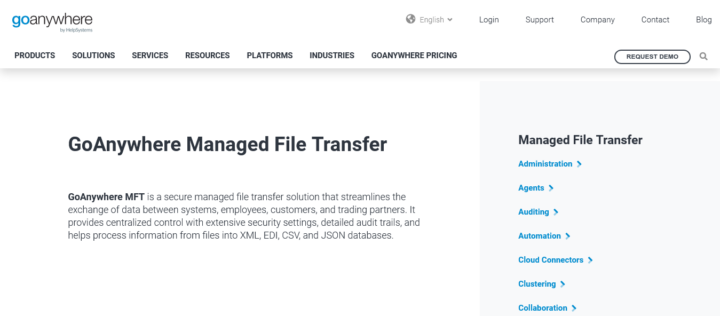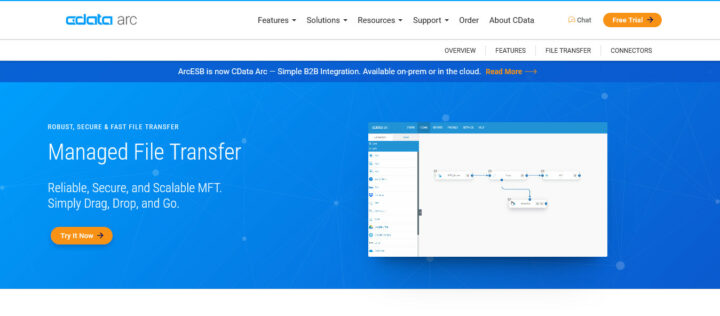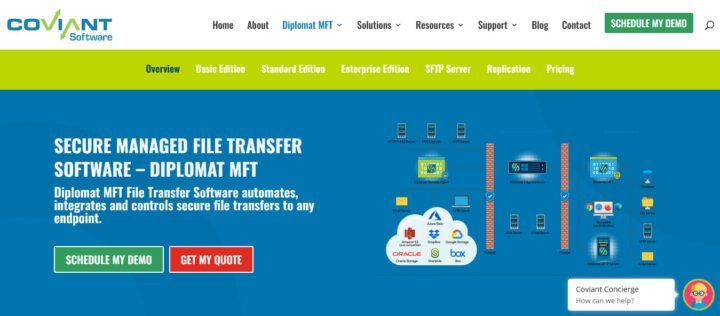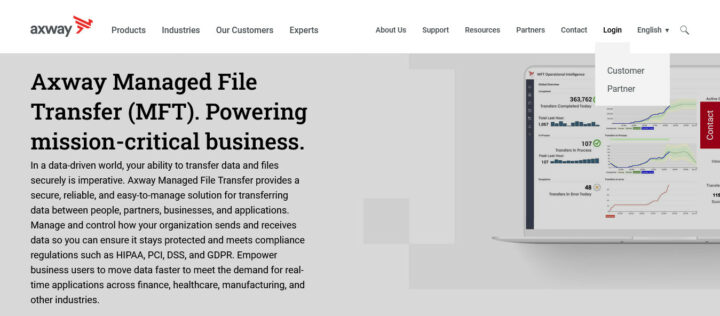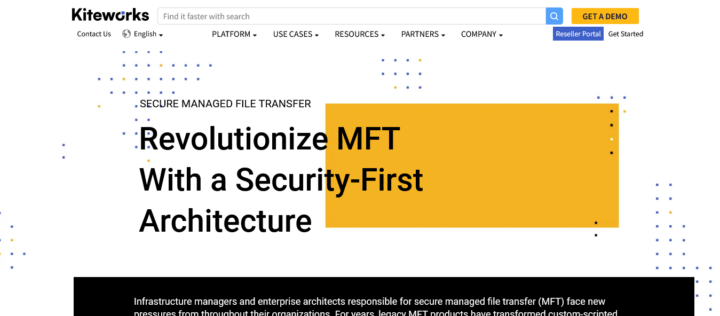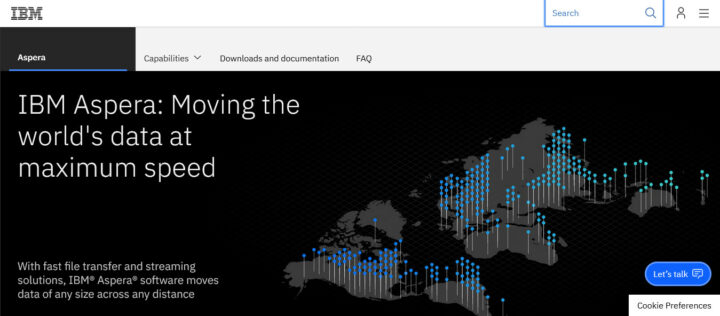
Every business needs quick and secure file transfer. You can use secure managed file transfer (MFT) software. File transfer among team members and other stakeholders is unavoidable in every company’s business process. It should ensure rapid and secure file transfer to keep up with changing business needs, especially if the organization interacts with IT. While there are several file transfer and sharing techniques, managed file transfer solutions have recently gained popularity. Read about secure managed file transfer, features, and the best managed file transfer software apps here.
What Exactly Is Managed File Transfer?
MFT, or managed file transfer, is a reliable and efficient method of the secure file transfer. Before transmitting your file or data to the recipient, MFT tools encrypt it using Open PGP, AES cyphers, or other protocols. It is regarded as superior to other file transfer techniques and protocols, such as file transfer protocol (FTP), secure file transfer protocol (SFTP), and hypertext transfer protocol (HTTP). MFT is appropriate for sharing compliance-protected, sensitive, or high-volume data. As a result, retail, manufacturing, healthcare, finance, telecommunications, and insurance companies favor this strategy over others.
What Is The Difference Between MFT And Other File Sharing Options?
Consider how MFT differs from other common file transfer protocols:
1 – MFT vs. FTP – Secure encryption is provided by MFT solutions. Experts do not recommend FTP since it does not encrypt your files in transit or at rest.
2 – MFT vs. FTPS – MFT is preferable to FTPS since the latter requires private and public key authentication for decryption.
3 – MFT vs. SFTP – Client setup and key management are more involved in SFTP than in MFT.
4 – MFT vs. HTTP – Unlike MFT, the HTTP protocol is not recommended since it does not offer encryption.
Managed File Transfer Solutions Benefits
Visibility
Damage may be reduced by predicting and reviewing risk factors. In addition, MFT offers operational insight into problems like as unsuccessful transfers, assisting you with proactive issue resolution and SLA compliance.
Scalability
With worldwide business expansion, a company’s file transfer needs are expected to increase with time. As a consequence, you will want more file transfer bandwidth as well as additional file sharing components. MFT solutions help you keep up with your company’s expansion.
Security
Avoiding botched file transfers and data breaches are some of the best methods for any company to protect its reputation. MFT offers companies a proactive security plan. It also safeguards your data during file transfer and at rest with features such as real-time monitoring and validation security policies.
Budget-Friendly Customization
Data and file sharing requirements differ from company to company. Many managed file transfer software apps available on the market provide a customized solution. Users may choose the MFT tool that best fits their needs.
Compliance
Depending on the business, your company must follow various legal and industry-specific laws and compliances. These may include the Health Insurance Portability and Accountability Act (HIPPA) and the Payment Card Industry Data Security Standards (PCI DSS.) The modern-day MFT system is designed to meet security needs by encrypting, monitoring the transfer, and storing essential data.
Regular Updates
If your business deals with sensitive or vital data, you must exercise extreme caution while sharing it with others. To protect your files from hackers, employ solutions that provide frequent updates. MFT tools give updates to assist you in staying ahead of changing data security needs.
Flexibility
Some businesses opt to install just on-premise apps, while others rely on cloud-based services. Aside from them, a small number of businesses adopt a hybrid solution. You can acquire an MFT tool to deploy anywhere you want, regardless of your policy.
Managed File Transfer Software Features
Businesses often choose MFT solutions to save time, effort, money, and resources. In addition, effective MFT tools make monitoring and auditing the file transfer process possible. Check the following features before selecting a tool for secure managed file transfer:
Ease-of-Use – Choose an app that increases your productivity without requiring you to build scripts for data transfer.
Extensive File Type Support – Before selecting an MFT tool, check how many file types it supports for transfer. For example, it should be able to transfer PDFs, multimedia files, XML, EDI, and email.
Security – Your MFT tool should provide optimal security (encryption) features in transit and at rest for internal and external transfers.
Data Analytics – If you need to collect data regarding file transfers for HIPAA compliance, it is best to choose tools with analytics and reporting capabilities.
Central Workflow Automation – With a solid MFT tool, you can manage and plan file transfers from a single platform.
Complete Visibility – MFT software should provide 360-degree visibility, allowing you to see who shares what with the system.
Here is a list of the best MFT software to assist you in selecting the properly managed file transfer solution:
5+ Best Managed File Transfer Software You Can Use
Managed File Transfer Software you can use in 2022.
1. Progress MOVEit
Organizations may reduce corporate mobility risks by using MFT software Progress MOVEit. This open-source framework includes essential central access restrictions, data encryption, and tracking. These characteristics guarantee that your organization’s file transfer meets SLA and becomes operationally dependable. Users may also transfer files with internal and external users using the collaboration capabilities feature. Without programming, Progress MOVEit supports powerful automated processes. If your company has many mobile device users participating in file transfer, this platform architecture also offers a tailored solution for mobile device management.
2. GoAnywhere
It is a secure, managed file transfer software that allows users to transfer transfers between computers and servers. Users have centralized control over the process and may operate GoAnywhere on Windows, Linux, IBM I OS, and AIX. Using load balancing, this tool may execute mass file transfers by company needs. Its features, such as a simple interface and a comprehensive workflow, are enough for your organization’s requirements. GoAnywhere offers several deployment options to guarantee total flexibility. You may also combine it with your organization’s other cloud and web apps. This tool offers active-active automated failover as a disaster recovery technique.
3. ArcESB
It is a modern MFT software that allows you to develop file-sharing schemes and manage them centrally. The powerful and scalable platform supports drag-and-drop, making file sharing easy and rapid. In addition, you may have real-time insight into all file transfers in your organization thanks to its extensive logging and auditing. ArcESB supports many data protection requirements, including GDPR, HIPAA, and PCI. ArcESB enables you to abandon manual file sharing in favor of an automated and scheduled process based on conditional logic, webhooks, and API management. It employs AES, Open PGP, and secure DMZ to provide complete data security.
4. Diplomat MFT
Diplomat MFT is the tool to use if your company seeks a dependable MFT solution that will save file transfer time and effort. It lets you transfer files between persons linked by a local network via HTTP, HTTPS, email, and SMB servers. This platform is simple to incorporate into your day-to-day business procedures. You may also use this MFT software to automate and control your file transfer. As a result, there will be a reduced business risk. This tool has PGP encryption, features, alarm notification, process automation, and auditing.
5. Axway
Axway offers a dependable and secure managed file transfer solution, particularly for the healthcare, financial, and industrial sectors. This platform supports file sharing between companies, workers, partners, and apps. It not only puts you in control of your organization’s file transfer demands but also conforms to standards such as HIPAA, PCI, DSS, and GDPR.
6. Kiteworks
Kiteworks offers a secure infrastructure that enables large-scale file transfer. The graphical operations dashboard of this tool allows users to simplify and manage file-sharing activities. You can easily create any process using this software and bring on additional partners. You may initiate a file transfer manually or schedule it at a certain time. Kiteworks’ vault-to-vault transfer tool maintains the security of transmitted files from beginning to finish. Data may be accessed through folders, repositories, and the cloud. In addition, the software enables you to create visual processes without coding by using a library of hundreds of workflow operations.
7. IBM Aspera
IBM Aspera is a highly adaptable platform that may be deployed on-premises or in the hybrid cloud. Rather than optimizing file transfers, it uses all available network bandwidth to eliminate underlying bottlenecks. It also supports huge file transfers, data transfer automation, hybrid cloud workflows, and secure asset exchange via blockchain technology.
Wrapping Up:
Managed file transfer solutions are required to maintain security and keep ahead of the competition, particularly for companies with complex file sharing needs or external stakeholders. These, too, play an important part in a company’s success. Only specialized tools can provide the correct secure managed file transfer service as business networks continue to grow internationally and offer excellent service.
